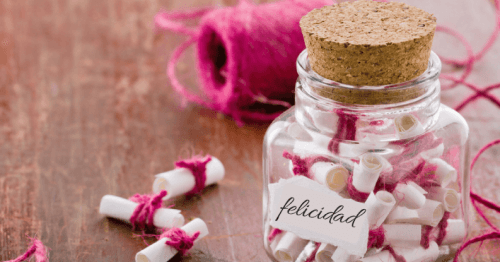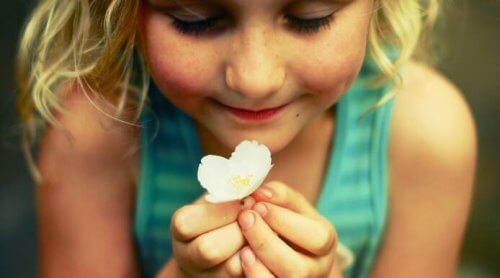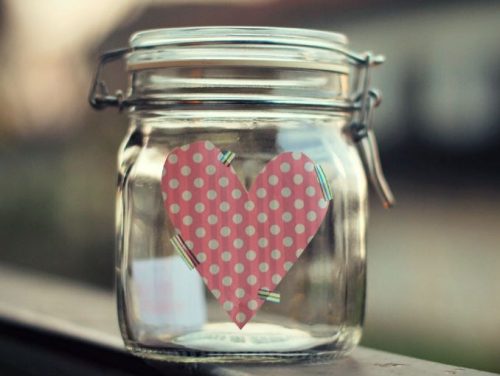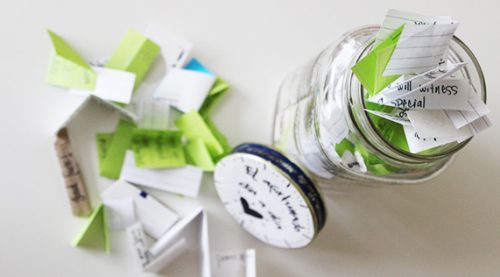Happiness Jar: An idea Your Kids Will Love


Written and verified by psychologist Valeria Sabater
It’s often said that happiness as fragile as a fine crystal. However, a crystal that is taken care of daily shines and sparkles. It’s all about protecting it. The same happens with happiness. Find out how to protect it with a happiness jar here.
Therefore, to take care of such a valuable aspect of our lives, we need to show acts of love. We need to know how to make plans to show this, not just carry out spontaneous acts.
One way to accomplish this is to follow our suggestions in this article. It’s a motivational technique that tends to get good results with small groups of people. This works in a classroom, work groups, and best of all, in a family.
The object is simple: fill it daily with positive thoughts about others. These should be thoughts and original phrases, feelings, encouragement, love, and inspiration. Below, we’ll explain how to do this and the benefits of it.
1.Using our emotional intelligence

In our daily lives, we don’t always find the right time to tell our loved ones how much we care for them. This includes our parents, our children and our partner.
This takes a little work because it’s not always easy to find words to express our emotions. Therefore, having this happiness jar makes it simpler. Every day, we have to use our emotional intelligence to learn and better demonstrate our positive emotions.
Some of the simple phrases we can use are the following:
- I feel proud of you for how you dealt with the problem that you had.
- I love it when you smile. You are truly special.
- Thanks for the sweet thing you did for me yesterday. You’re very important in my life.
- I thought a lot about you at work today. I really felt like coming home to see you.
- I’m sorry that yesterday I made you angry. Sometimes I don’t think when I speak, and then I am sorry. I just want you to know that you are the most beautiful part of my life
Also read: What If We Stop Complaining?
2. The happiness jar helps teach our children

The happiness jar is a very good strategy to use in the education of our children. It will help them in the following ways. Each day, they can receive positive reinforcement from us that will help them grow and to mature:
“I’m proud of you for your effort at school.” “I like how you take responsibility for your things.” “Don’t worry about that mistake that you made, Mom and Dad trust you and know that the next time you’ll do better….”
At the same time, they should leave little messages for us. That way, they’ll be obligated to do exercises of reflection, emotional expression, and analysis.
Likewise, the fact that the happiness jar emphasizes the positive is enough in itself. This is something that provides motivation and security when they need it most.
Also read: How social media affects our emotions
3. We reexamine the beautiful little details
In addition, small gestures make people happy. These are small acts full of love and genuine caring. It’s all about knowing what we need and what we like as well.
The happiness jar is a place to put all of these little gestures. It’s where we receive a “thanks” for being a certain way or an “I like how you are,” or ” I love to be by your side”. In other words, they are simple phrases that are, short and basic and will sweeten our life, make our day bright, and motivate us.

4. We cultivate gratitude
When we’re in a family, many times we take things for granted. We think that what our partner does is just normal or expected. We tell ourselves that our mother, our grandfather, or siblings do certain favors because it’s the routine in the family unit.
However, when we take things for granted, we lose the magic. At the same time, the person doing these nice little favors may feel disappointed and not appreciated.
Because of this, never forget to say “thank you”, write them an “I love you”, or remind them “What would I do without you?” This is a simple strategy that you will get a lot out of.
5. We focus on the positive

Critical issues like fatigue and stress are abundant in our daily lives. And, it’s this stress that obligates us to rush around without focusing on who we have close to us and what is essential to the heart. At times, we don’t express our appreciation.
- The purpose of the messages that we leave in the jar every day is to focus only on the positive.
- When we do this, we change our chip. We stop giving so much relevance to what bothers us and what worries us. Instead, we focus on the goodness of our loved ones, remember that we truly love them, and remember what makes us happy.
In conclusion, we recommend that you do this at home with the help of the children. Choose a beautiful glass jar, decorate it, and start today to write positive messages.
All cited sources were thoroughly reviewed by our team to ensure their quality, reliability, currency, and validity. The bibliography of this article was considered reliable and of academic or scientific accuracy.
-
Lantieri, L., & Goleman, D. P. (2008). Building emotional intelligence: Techniques to cultivate inner strength in children. Sounds True.
-
Park, N., & Peterson, C. (2006). Character strengths and happiness among young children: Content analysis of parental descriptions. Journal of Happiness Studies, 7(3), 323-341.
-
Dunn, E. (2016). The Jar of Happiness. The School Librarian, 64(3), 153.
-
Witvliet, C. V., Richie, F. J., Root Luna, L. M., & Van Tongeren, D. R. (2019). Gratitude predicts hope and happiness: A two-study assessment of traits and states. The Journal of Positive Psychology, 14(3), 271-282.
-
Berkowitz, MW (2001) La ciencia de la educación del carácter. Institution Press Stanford,
-
Argyle, M. (2001) La psicología de la felicidad. Routledge: East Sussex
This text is provided for informational purposes only and does not replace consultation with a professional. If in doubt, consult your specialist.








